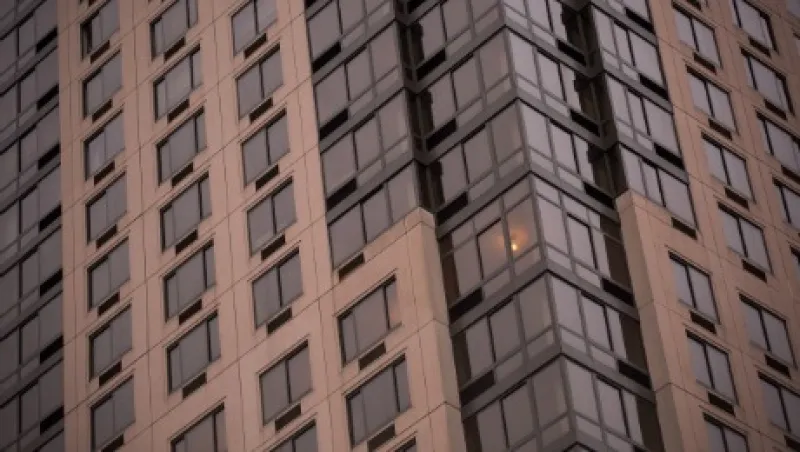After the Great Recession, U.S. commercial real estate values shot nearly straight up, doubling from 2009 through 2015. Now, though, the party might be ending. Property prices appear to have reached a plateau, and might even be poised for a downturn.
Apartment owner Bascom Group, an Irvine, California–based private equity firm with $2 billion in its multifamily portfolio, has yet to see a softening in prices. “I don’t know if [a pattern is] showing up in the data yet,” says Scott McClave, Bascom’s senior principal for acquisitions and finance, who remains confident about the apartment market.
Among the cities where Bascom owns properties, Los Angeles, San Diego, the San Francisco Bay Area, Denver and Las Vegas show prices that remain strong, McClave observes. Houston has shown a decline.
U.S. commercial property values rose by an average of 10 percent in 2015, a welcome gain for investors who saw the nation’s stock market decline slightly for the year, and prices are up 30 percent over the past three years, according to an index created by Green Street Advisors, a commercial real estate research firm in Newport Beach, California.
Since 2009 commercial property values have doubled, by Green Street’s reckoning. The firm’s index, which assigns a value of 100 to commercial property values as of August 2007, plunged to 61.2 in 2009 before rebounding sharply to 122.7 at the end of 2015.
During the recovery, capital poured into commercial real estate from institutional investors at home and abroad, buoying everything from trophy office properties in Boston, New York and San Francisco to suburban apartment complexes in Colorado, Florida and Texas.
But a one-two punch of rising interest rates and rich valuations means that price declines are “a very real possibility” this year, according to Peter Rothemund, senior analyst at Green Street. “I think real estate is 15 percent to 20 percent above fair value,” he says. “I don’t know if values will necessarily correct that much.”
Others have a more optimistic outlook. They point to a still-growing U.S. economy — highlighted by the drop in the unemployment rate to 4.9 percent in January — and a lack of speculative development since the 2008 financial crisis.
“Some of the price appreciation has cooled down, but you haven’t seen that much new development outside of apartments,” says Mark Vitner, a senior economist at Wells Fargo Economics Group, a division of Wells Fargo & Co., in Charlotte, North Carolina. “Interest rates are likely to remain low for an exceptionally long period of time, which makes investing in real estate more attractive.”
Peter Linneman, chief economist for NAI Global, a New York–based network of commercial real estate brokerages, is also bullish. “Landlords will continue to see growing rental rolls this year,” he says. “Supply growth has picked up, especially for industrial space and hotels, but demand growth will continue to exceed supply growth.”
Not all market watchers are so sanguine. David Shulman, senior economist with think tank UCLA Anderson Forecast at the University of California, Los Angeles, sees a price drop ahead. He expects less demand from foreign buyers, who had helped drive U.S. real estate values to record levels. Sovereign wealth funds from the Middle East and Russia have seen their buying power sapped by plunging oil prices, Shulman says.
But this downturn is unlikely to approach the severity of the commercial real estate crash of 2008 and 2009, he adds. “There’s less leverage in the system this time,” Shulman says. “If the last crash was like double pneumonia, this will be like a low-grade cold that sticks around for a long time.”
Investors already have felt some minor pain from the cooling of commercial properties. The price of all real estate investment trusts in the FTSE NAREIT U.S. Real Estate index dipped 2 percent in 2015, although dividend yields topping 4 percent kept REIT investors’ total returns barely out of the red for the year. REITs’ performance was hampered by expectations that the U.S. Federal Reserve Board would begin raising rates, thereby making REITs a less appealing option than bonds.
Nearly everyone agrees that 2016 will be a tough year for commercial real estate in Houston, a city hit hard by the oil slump. But property values remain strong in the so-called gateway cities of New York and San Francisco and in technology hubs such as Silicon Valley. Wells Fargo’s Vitner says tech employment in Silicon Valley has finally returned to its 2000 peak.
Among property types, malls seem the riskiest at the moment, Shulman says, as online shopping continues to poach sales from brick-and-mortar stores.
In some ways, commercial real estate prices are a victim of their own torrid gains. In the past half decade, investors have pushed prices to record highs, sending capitalization rates — a measure of property values — to record lows.
At 5 percent on average, cap rates — a property’s income stream divided by its price — have dipped below the 5.5 percent average for long-term corporate bond yields, Green Street’s Rothemund says. “For most of this cycle, real estate looked quite attractive,” he notes. “Now cap rates are below bond yields, and that’s not very attractive.”
Even if there is a correction, commercial real estate prices seem unlikely to repeat the plummet of 2008–’09, Rothemund reckons. Values are less frothy, and underwriting standards aren’t as loose. “It’s definitely different than last time,” Rothemund says. “There’s not the giddiness.”
Bascom’s McClave doubts that apartment prices will plunge. After all, household formation is poised to grow as the labor market recovers, and comparatively low homeownership rates show that many Americans are choosing to rent rather than buy. “Everybody is starved for yield, and apartments are one of the best sources of yield,” McClave says.






